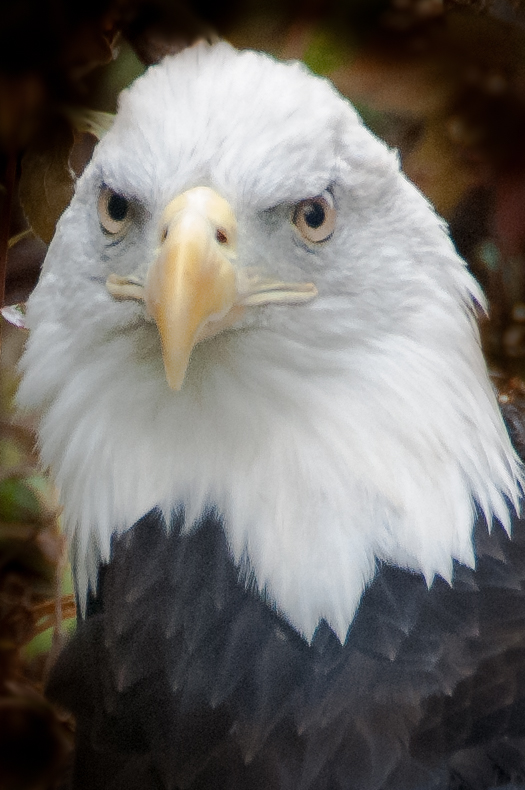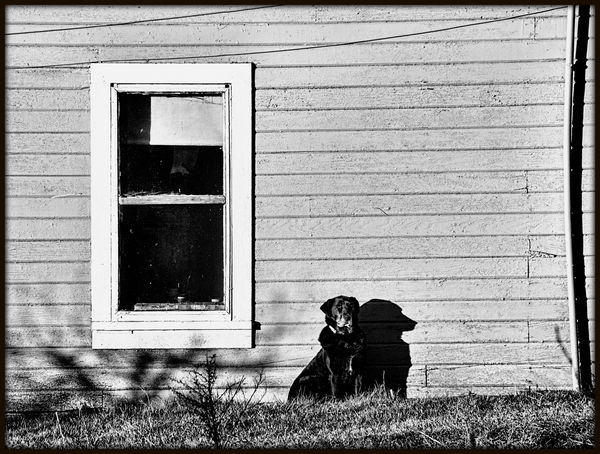How do you define or think of photographic vision? How important is it?
Nov 5, 2019 11:11:53 #
Much is made of the importance of a photographer’s vision and his/her deliberate actions performed to express that vision pictorially. The argument goes that a good photographer always knows what he/she wants and knows how to get it. Ansel Adams comes to mind.
I was recently reminded of this business of photographic pre-visualization and intent when I posted an image that was basically a grab shot but, to me at least, turned out to be more than that. So, is it possible to create a good photo based on a “vision” and photographic translation of that vision that is at least in part produced subconsciously? Should a photographer always have to be able to explain what he wanted to say (intent) and why he took the steps he took to get to the final product (in camera or post)?
Curious how the UHH community lines up on this. Is there room in your photography to give your sub conscience an active voice, or do you think that all your photographic actions/decisions need to be conscious and deliberate?
I was recently reminded of this business of photographic pre-visualization and intent when I posted an image that was basically a grab shot but, to me at least, turned out to be more than that. So, is it possible to create a good photo based on a “vision” and photographic translation of that vision that is at least in part produced subconsciously? Should a photographer always have to be able to explain what he wanted to say (intent) and why he took the steps he took to get to the final product (in camera or post)?
Curious how the UHH community lines up on this. Is there room in your photography to give your sub conscience an active voice, or do you think that all your photographic actions/decisions need to be conscious and deliberate?
Nov 5, 2019 11:38:26 #
srt101fan wrote:
Much is made of the importance of a photographer’s... (show quote)
I've been at this for 52 years. in the beginning, I was mindful of my creative intent all the time. With the passing of time, the snapping of the shutter has become automatic, and most of the time the results are in line with my intent, actively considered or passively experienced.
I think the photographer should be able to explain the intent, though I am not sure it is always an active part of the creative process, but it is certainly part of the subconscious part of the creative process. It "informs" the choices we make. You can see this in action when you bring a group of photographers to a place and let them loose. If you have 5 people you will usually see 5 completely different approaches to the place. Each person's creative choices and intent is informed by the now and the past - the now is active and the past can be both actively considered and subconsciously contributing.
Nov 5, 2019 11:43:14 #
Visualization does help when seeing what you're wanting to shot and I use this often. yet trying to convey this visualization to the camera is not that easy. In my case, not often does the image turn out as I had hoped. if I sit and look at the digital image long enough I'll find what it is I was shooting, tree, limb, flower etc. and crop to that visualization I was attempting to achieve the first time.
Take my most current image. I was asked to create an image using text or letters.. Not willing to get outside on that day I recall an old key board in the basement , popped the keys off and shot an image of the keys scattered about on the counter top.

The visualization was that I wanted the escape key to stand out. later after studding my shot, I though that I should have create a flow within the image from foreground to background using the same lighting.. I didn't like the harsh light effect in the background, but it was good enough to submit to the letters challenge.
The point is, I seen in my mind how I wanted to achieve the shot, so I lowered the tripod, set the camera up and dropped the keys on the counter top. Though it may have been a more dramatic effect is I took a long exposure to create a blurry of keys dropping.
Take my most current image. I was asked to create an image using text or letters.. Not willing to get outside on that day I recall an old key board in the basement , popped the keys off and shot an image of the keys scattered about on the counter top.

The visualization was that I wanted the escape key to stand out. later after studding my shot, I though that I should have create a flow within the image from foreground to background using the same lighting.. I didn't like the harsh light effect in the background, but it was good enough to submit to the letters challenge.
The point is, I seen in my mind how I wanted to achieve the shot, so I lowered the tripod, set the camera up and dropped the keys on the counter top. Though it may have been a more dramatic effect is I took a long exposure to create a blurry of keys dropping.
Nov 5, 2019 11:50:10 #
I have taken some great pictures (by my meager standards) that were sh*t luck. As time goes on, the fraction of grab shots that are good, or good enough, has increased. There's something to be said for experience.
That said, I get a much higher percentage of keepers when I take the time to think about what I'm doing. Even then, the best of them touch on something numinous.
I can't always articulate what it is that compelled me to take the picture, even when it comes out well. Part of what keeps me going is those moments when I tap into a wellspring that's deeper than my understanding. In the end, the photo needs to stand on its own. If I have to explain it for someone else to get it, then the photo has failed in some way.
That said, I get a much higher percentage of keepers when I take the time to think about what I'm doing. Even then, the best of them touch on something numinous.
I can't always articulate what it is that compelled me to take the picture, even when it comes out well. Part of what keeps me going is those moments when I tap into a wellspring that's deeper than my understanding. In the end, the photo needs to stand on its own. If I have to explain it for someone else to get it, then the photo has failed in some way.
Nov 5, 2019 11:53:34 #
srt101fan wrote:
Much is made of the importance of a photographer’s... (show quote)
For me simply stated, I always ask myself, "What am I tring to say from the view that I see?"
I need to see that answer in the viewfinder or I have to change something.So confrunted with this Eagle, My thought for the image was "Eagle Eyes"

Nov 5, 2019 12:05:05 #
I'm no artist, but I do think about every shoot ahead of time, if time permits. Such things as time of day, angle of light, the subject itself require some planning. That said, with the low cost of a few more digital shots, also shoot the unplanned. One never knows what's around that next corner.
Nov 5, 2019 12:15:23 #
First, I agree with htbrown that an image should stand on its own and not require explanation...except when it does. I'm thinking of documentary-type images for those cases where explanation may be needed. Sometimes a title provides just enough information. For fine art, I like the idea that viewers should be free to make their own interpretation; each person responding differently, based on their own histories and interests.
Most of my own favorite photos from 2013 through 2017 were a combination of deliberate steps and reaction to what I stumbled upon (I don't remember much about how I approached photography prior to joining UHH).
The most pre-visualization I might do was to seek photo ops for a specific storytelling theme, such as hops or apple harvests. Then, I would drive around looking for scenes that would help tell those stories and compose individual shots accordingly.
Otherwise, my deliberate actions would usually be about seeking interesting light or weather conditions and then I think my sub-conscious takes over to capture whatever beautiful-to-me experience is there. Occasionally I'd see something with possibly a bit more substance, but most of my photos are not for deep thinkers
Here are two where I felt an emotion and clicked - no conscious thought whatsoever.
Most of my own favorite photos from 2013 through 2017 were a combination of deliberate steps and reaction to what I stumbled upon (I don't remember much about how I approached photography prior to joining UHH).
The most pre-visualization I might do was to seek photo ops for a specific storytelling theme, such as hops or apple harvests. Then, I would drive around looking for scenes that would help tell those stories and compose individual shots accordingly.
Otherwise, my deliberate actions would usually be about seeking interesting light or weather conditions and then I think my sub-conscious takes over to capture whatever beautiful-to-me experience is there. Occasionally I'd see something with possibly a bit more substance, but most of my photos are not for deep thinkers

Here are two where I felt an emotion and clicked - no conscious thought whatsoever.


Nov 5, 2019 12:15:30 #
Nov 5, 2019 12:17:45 #
PixelStan77 wrote:
For me simply stated, I always ask myself, "What am I tring to say from the view that I see?" I need to see that answer in the viewfinder or I have to change something.
Well said, sir!
Nov 5, 2019 12:36:49 #
Strodav
Loc: Houston, Tx
Sometimes I just grab memory shots like 100s of millions of people around the globe that own a camera. A few of those shots come out pretty well. Maybe partly because of photography skills, but more likely can be summed up by the phrase "even a blind squirrel finds an acorn every once in a while". Other times, I apply all that I have learned on both the technical and creative sides planning all elements of a shot to tell a story and set a mood through an intriguing image - at least to me. So, "Always be able to explain", No, but it's the shots I plan that I am most proud of and express more of who I am.
Nov 5, 2019 12:43:09 #
For subjects, and scenarios, that I have shot before I will know what I will achieve.
However when shooting something brand new, like on vacation in overseas countries or steam trains in the fog, you sometimes just have to "wing" it. Having the skills to see (be very alert) images and capture them helps a lot.
However when shooting something brand new, like on vacation in overseas countries or steam trains in the fog, you sometimes just have to "wing" it. Having the skills to see (be very alert) images and capture them helps a lot.
Nov 5, 2019 13:06:17 #
For almost every image, but certainly not all images, I think "vision." This comes almost naturally to me now, based on my knowledge of the artistic guidelines in photography, my knowledge of the equipment I use and how an image will turn out, and the skill I've developed over the years. The two sets of images below show what I mean by vision. Often I can see a subject and I'll know exactly how to photograph the image and what I can do with the image in processing. I believe that it takes skill and very specific knowledge to find one's vision. Maybe we all have it and don't know it or maybe some people have more of it than others. I do think it can take an image "one step above" which is always what I strive for and learn from when it doesn't work out. In general, I can actually see the end result of something in my mind while at other times the initial vision changes and moves as I shoot or process. For me, it's a combination of how my brain works, the equipment I use, and the processing software that I know well that makes it work out at times. So, to answer your question, photographic vision is of primary importance to me in almost every shot I take.
Nov 5, 2019 13:13:52 #
srt101fan wrote:
It depends.Much is made of the importance of a photographer’s... (show quote)
Sometimes I take a photo "on purpose".
Sometimes I take a photo that was "begging to be taken".
Nov 5, 2019 13:15:57 #
RichardTaylor wrote:
I think this is where understanding the importance of light plays a large role.... Having the skills to see (be very alert) images and capture them helps a lot.
Nov 5, 2019 13:17:52 #
via the lens wrote:
Connie, these are beautiful examples of processing to complete your artistic vision!For almost every image, but certainly not all imag... (show quote)
If you want to reply, then register here. Registration is free and your account is created instantly, so you can post right away.









